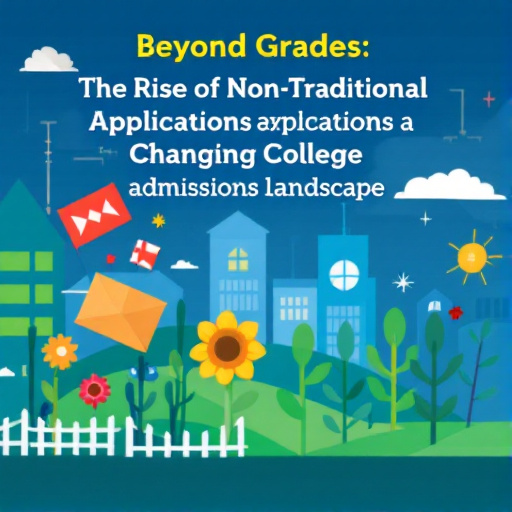Featured Articles
- 5 Unexpected Financial Aid Secrets Every College Applicant Must Know Before You Submit
- "Beyond Grades: How Mental Health Spaces Are Shaping College Applications in 2023"
- "Beyond Grades: The Rise of Non-Traditional Applications in a Changing College Admissions Landscape"
- Beyond the Basics: How TikTok Influencers are Shaping College Application Trends in 2023
- The Hidden Cost of College Applications: How Mental Health Influences Admission Success
"Beyond Grades: How Mental Health Spaces Are Shaping College Applications in 2023"
"Beyond Grades: How Mental Health Spaces Are Shaping College Applications in 2023"
In 2023, college applications are increasingly reflecting the importance of mental health spaces, reshaping the way students present themselves to admissions committees. As educational institutions acknowledge the complexities of student well-being, a transformative wave is emerging that prioritizes psychological resilience alongside traditional academic metrics.
The Evolution of College Admissions
For decades, college admissions have been dominated by a singular focus on grades and standardized test scores. However, the landscape is shifting. A recent survey by the National Association for College Admission Counseling (NACAC) noted that 71% of college admissions officers consider personal qualities, including emotional maturity and mental health, when evaluating candidates (NACAC, 2022). It's a significant change that urges future students to shift perspectives on what constitutes a “well-rounded” individual.
The Mental Health Crisis in Education
Before diving deeper into how mental health is influencing college applications, it’s essential to understand the context. Over the past few years, a significant portion of the student population has faced mental health challenges. According to a 2021 report from the American Psychological Association, nearly 60% of college students reported overwhelming anxiety, while 43% experienced depression. These statistics are alarming, underscoring the need for mental health recognition and addressing how it factors into the college experience.
A Personal Touch: Crafting Narratives
Imagine Maria, a high school senior who excelled academically but struggled with anxiety that sometimes overshadowed her achievements. In her college application essay, Maria chose to write about her journey through mental health challenges, focusing on how therapy equipped her with coping strategies and the ability to bounce back from setbacks. This narrative presented her resilience and personal growth, compelling qualities that moved the admissions committee beyond her GPA and standardized test scores.
Why Mental Health Matters in Applications
Students like Maria represent a growing trend: utilizing narratives around mental health to provide a fuller picture of their selves. College admissions officers recognize that students equipped with mental fortitude may tackle academic and social challenges more effectively. It’s no longer just about numbers; it’s about nurturing individuals who can contribute positively to campus life.
Breaking the Stigma
The stigma surrounding mental health is gradually eroding, aided by conversations sparked by movements like #MentalHealthAwareness and campaigns led by organizations such as Active Minds. More and more, students are encouraged to discuss not just their accomplishments but also their vulnerabilities. Case studies suggest that students who candidly share their struggles often connect better with admissions teams, fostering a sense of community and understanding.
Statistics Don't Lie
In a recent study by the National Center for Student Mental Health, it was revealed that students who participated in mental health programs reported a 20% improvement in their academic performance. This data shows a correlation between mental well-being and academic achievement, making it a credible talking point for students wishing to highlight their holistic development.
Steps Colleges Are Taking
Colleges themselves are recognizing this shift. Many institutions are now establishing mental health spaces, which encompass safe zones, therapy rooms, and even wellness workshops. For example, the University of California recently launched a campaign to increase awareness around mental health resources, integrating them into student orientation schedules—an initiative that reflects the prioritization of mental health alongside academic rigor.
The Future: Integrating Wellness into Curriculum
Some progressive institutions are even integrating mental health education into their curricula, making it a foundational aspect of academic life. Colleges like Yale University now offer courses on emotional wellness as part of their psychology program. By normalizing discussions about mental health, these institutions prepare students for both academic and life challenges while solidifying mental health as a crucial component of the college experience.
A Shift in Expectations
As we navigate through 2023, it's clear that expectations are evolving. No longer are prospective students solely judged by their scores on SATs or ACTs. Instead, admissions committees are increasingly interested in the journey a student has taken—one that encompasses academic performance, mental health, social engagement, and personal resilience.
Peer Support Programs
Moreover, peer support programs are becoming paramount in fostering a culture of mental well-being on college campuses. These initiatives have proven effective in promoting healthy lifestyle choices, reducing the stigma of mental illness, and building community. According to a study published in the Journal of College Counseling, peer-led support groups resulted in a 37% reduction in anxiety among participants.
A Call to Action for Students
For students readying their applications, the time has come to embrace vulnerability. Your story matters, and mental health is an integral part of that narrative. Authenticity can be your strongest asset, enabling those reviewing applications to connect with you as an individual rather than just another name on an endless list. Admissions committees want to hear how you’ve navigated challenges, learned resilience, and fostered a growth mindset.
Leveraging Mental Health Resources
Before sitting down to outline your application, consider leveraging mental health resources available at your school. Counseling sessions, workshops, and support groups can bolster your mental health toolkit and provide essential life skills. Utilizing these resources not only promotes your well-being but may also deepen your insights for personal statements and essays.
A Humorous Detour
Now, let’s take a lighthearted detour. Imagine trying to impress college admissions officers with your love for pop culture references. "I may not have a 4.0 GPA, but I did binge-watch every season of The Office to practice resilience through Jim's pranks on Dwight!” While humorous, such statements only highlight the importance of mental health—because if we turn to laughs in tough times, maybe we’re all just a bit more resilient than we think!
Conclusion: Embracing a Holistic Approach
As we forge ahead, the intersection of mental health and college admissions signifies a broader cultural shift—a move toward recognizing the human experience beyond mere grades. In 2023, admissions committees invite prospective students to share their journeys, challenges, and triumphs, democratizing the admission process in a way that encourages a more inclusive, holistic approach. In this ever-evolving educational landscape, one truth remains clear: your story matters, and mental health is part of that fabric. So be courageous. Share that story, and let your resilience shine.
In the end, it's about viewing ourselves and others as multifaceted individuals. As we redefine success in college applications, let's embrace mental health recognition as a cornerstone of true academic and personal achievement.




